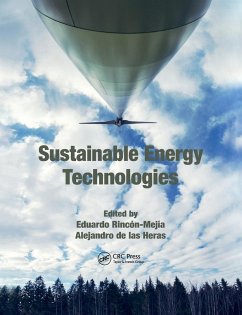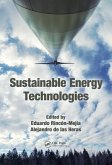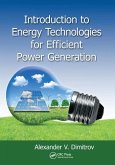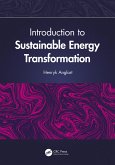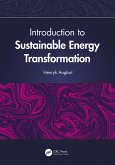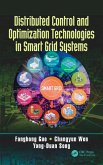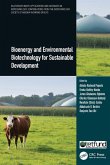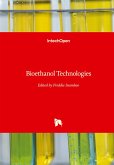Sustainable Energy Technologies
Herausgeber: Rincón-Mejía, Eduardo; De Las Heras, Alejandro
Sustainable Energy Technologies
Herausgeber: Rincón-Mejía, Eduardo; De Las Heras, Alejandro
- Broschiertes Buch
- Merkliste
- Auf die Merkliste
- Bewerten Bewerten
- Teilen
- Produkt teilen
- Produkterinnerung
- Produkterinnerung
This book examines the key aspects that will define future sustainable energy systems: energy supply, energy storage, security and limited environmental impacts. It clearly explains the need for an integrated engineering approach to sustainable energies, based on mathematical, biogeophysical, and engineering arguments. Resilient and efficient alternatives are compared to non-sustainable options. This book results from the collaboration of 50 international contributors.
Andere Kunden interessierten sich auch für
![Sustainable Energy Technologies Sustainable Energy Technologies]() Sustainable Energy Technologies290,99 €
Sustainable Energy Technologies290,99 €![Introduction to Energy Technologies for Efficient Power Generation Introduction to Energy Technologies for Efficient Power Generation]() Alexander V. DimitrovIntroduction to Energy Technologies for Efficient Power Generation70,99 €
Alexander V. DimitrovIntroduction to Energy Technologies for Efficient Power Generation70,99 €![Introduction to Sustainable Energy Transformation Introduction to Sustainable Energy Transformation]() Henryk AnglartIntroduction to Sustainable Energy Transformation305,99 €
Henryk AnglartIntroduction to Sustainable Energy Transformation305,99 €![Introduction to Sustainable Energy Transformation Introduction to Sustainable Energy Transformation]() Henryk AnglartIntroduction to Sustainable Energy Transformation127,99 €
Henryk AnglartIntroduction to Sustainable Energy Transformation127,99 €![Distributed Control and Optimization Technologies in Smart Grid Systems Distributed Control and Optimization Technologies in Smart Grid Systems]() Fanghong GuoDistributed Control and Optimization Technologies in Smart Grid Systems234,99 €
Fanghong GuoDistributed Control and Optimization Technologies in Smart Grid Systems234,99 €![Bioenergy and Environmental Biotechnology for Sustainable Development Bioenergy and Environmental Biotechnology for Sustainable Development]() Bioenergy and Environmental Biotechnology for Sustainable Development71,99 €
Bioenergy and Environmental Biotechnology for Sustainable Development71,99 €![Bioethanol Technologies Bioethanol Technologies]() Bioethanol Technologies129,00 €
Bioethanol Technologies129,00 €-
-
-
This book examines the key aspects that will define future sustainable energy systems: energy supply, energy storage, security and limited environmental impacts. It clearly explains the need for an integrated engineering approach to sustainable energies, based on mathematical, biogeophysical, and engineering arguments. Resilient and efficient alternatives are compared to non-sustainable options. This book results from the collaboration of 50 international contributors.
Hinweis: Dieser Artikel kann nur an eine deutsche Lieferadresse ausgeliefert werden.
Hinweis: Dieser Artikel kann nur an eine deutsche Lieferadresse ausgeliefert werden.
Produktdetails
- Produktdetails
- Verlag: CRC Press
- Seitenzahl: 426
- Erscheinungstermin: 30. Juni 2020
- Englisch
- Abmessung: 246mm x 189mm x 23mm
- Gewicht: 819g
- ISBN-13: 9780367572679
- ISBN-10: 0367572672
- Artikelnr.: 69891534
- Herstellerkennzeichnung
- Libri GmbH
- Europaallee 1
- 36244 Bad Hersfeld
- gpsr@libri.de
- Verlag: CRC Press
- Seitenzahl: 426
- Erscheinungstermin: 30. Juni 2020
- Englisch
- Abmessung: 246mm x 189mm x 23mm
- Gewicht: 819g
- ISBN-13: 9780367572679
- ISBN-10: 0367572672
- Artikelnr.: 69891534
- Herstellerkennzeichnung
- Libri GmbH
- Europaallee 1
- 36244 Bad Hersfeld
- gpsr@libri.de
Eduardo A. Rincón was the Chair of the Solar Energy Division (2013-2014) and Chair of the Solar Heating and Cooling of the SED Technical Committee (2009-2013) for the American Society for Mechanical Engineers (ASME). He is Member of the Board of Directors (2005- ) and was the Secretary (2008-2009) for the International Solar Energy Society (ISES). He was the President of the Mexican Solar Energy Association (2002-2004). Other positions are: International Energy Foundation, Board of Directors Member (2002- ). Member of the Joint Public Advisory Committee (JPAC) of the Commission for Environmental Cooperation (CEC) of North America (2004-2008). In 2004 he received the Mexican Renewable Energy Award from the Ministry of Energy, Mexico. Professor Rincón works primarily in the area of Renewable Energy Technologies, with an emphasis on affordable solar technologies. His current research focus is the development of solar concentrators using non-imaging optics for applications such as solar cooking, water distillation, space heating, steam generation for industrial and residential uses, and high-flux research. Some of his latest developments include affordable small-scale wind generators, high-efficiency solar ovens and solar hotplates. He has authored over 40 articles in scientific and research journals. He has supervised over 60 graduate theses and taught Thermal Science as well as specific courses on solar energy applications, wind generators, and renewable energy systems. Alejandro de Las Heras (Demography DEA at Paris Sorbonne, PhD in Environmental Sciences at University of East Anglia) is an independent researcher based in Spain. He has worked with grassroots movements and NGOs in Mali, France and Mexico. He has also taught in higher education in England and Mexico. He has made systematic inroads in and published on applied sustainability: mammal conservation, predictions of deforestation, contraception and population dynamics, toxicological and cancer implications of dominant technologies. His current research and practice area is domestic biomethane production using waste, as part of his longterm interest in technology sustainability. With CRC Press he has edited Sustainable Science and Technology: An Introduction, Boca Raton, 2014.
1. Introduction 2. Solar and Geothermal Energies Are Sustainable; Nuclear
Power Is Not 3. Renewables-The Politics and Economics Behind Them 4. The
Constructal Design Applied to Renewable Energy Systems 5. Integration of
Renewable Energy Technologies in Buildings and Cities 6. Next Developments
in Solar Thermal Technologies 7. Advances in Solar-Assisted Air
Conditioning Systems for Tropical-Humid Locations 8. Absorption
Thermodynamic Cycles: Advanced Cycles Based on Ammonia/Salt 9. Hybrid Solar
and Geothermal Heating and Cooling 10. Thermal Energy Storage Systems for
Solar Applications 11. Solar Photocatalytic Energy 12. Novel Solar Fuels
from H2O and CO2 13. Tannins as Precursors of Supercapacitor Electrodes 14.
Recent Contributions in the Development of Fuel Cell Technologies 15.
Towards More Sustainable Aeronautics via the Use of Biofuels 16. Solar
Cooking for All 17. Sustainable Wind Energy Systems 18. Tidal Current
Technologies: Brief Overview and In-Depth Coverage of the State of the Art
19. From Large Dams to Sustainable Hydropower 20. Bioenergy Principles and
Applications 21. Advanced Biomethane Processes 22. Human Energy: System
Integration, Efficiency, Recovery 23. Sustainable Energy for Houses
Power Is Not 3. Renewables-The Politics and Economics Behind Them 4. The
Constructal Design Applied to Renewable Energy Systems 5. Integration of
Renewable Energy Technologies in Buildings and Cities 6. Next Developments
in Solar Thermal Technologies 7. Advances in Solar-Assisted Air
Conditioning Systems for Tropical-Humid Locations 8. Absorption
Thermodynamic Cycles: Advanced Cycles Based on Ammonia/Salt 9. Hybrid Solar
and Geothermal Heating and Cooling 10. Thermal Energy Storage Systems for
Solar Applications 11. Solar Photocatalytic Energy 12. Novel Solar Fuels
from H2O and CO2 13. Tannins as Precursors of Supercapacitor Electrodes 14.
Recent Contributions in the Development of Fuel Cell Technologies 15.
Towards More Sustainable Aeronautics via the Use of Biofuels 16. Solar
Cooking for All 17. Sustainable Wind Energy Systems 18. Tidal Current
Technologies: Brief Overview and In-Depth Coverage of the State of the Art
19. From Large Dams to Sustainable Hydropower 20. Bioenergy Principles and
Applications 21. Advanced Biomethane Processes 22. Human Energy: System
Integration, Efficiency, Recovery 23. Sustainable Energy for Houses
1. Introduction 2. Solar and Geothermal Energies Are Sustainable; Nuclear
Power Is Not 3. Renewables-The Politics and Economics Behind Them 4. The
Constructal Design Applied to Renewable Energy Systems 5. Integration of
Renewable Energy Technologies in Buildings and Cities 6. Next Developments
in Solar Thermal Technologies 7. Advances in Solar-Assisted Air
Conditioning Systems for Tropical-Humid Locations 8. Absorption
Thermodynamic Cycles: Advanced Cycles Based on Ammonia/Salt 9. Hybrid Solar
and Geothermal Heating and Cooling 10. Thermal Energy Storage Systems for
Solar Applications 11. Solar Photocatalytic Energy 12. Novel Solar Fuels
from H2O and CO2 13. Tannins as Precursors of Supercapacitor Electrodes 14.
Recent Contributions in the Development of Fuel Cell Technologies 15.
Towards More Sustainable Aeronautics via the Use of Biofuels 16. Solar
Cooking for All 17. Sustainable Wind Energy Systems 18. Tidal Current
Technologies: Brief Overview and In-Depth Coverage of the State of the Art
19. From Large Dams to Sustainable Hydropower 20. Bioenergy Principles and
Applications 21. Advanced Biomethane Processes 22. Human Energy: System
Integration, Efficiency, Recovery 23. Sustainable Energy for Houses
Power Is Not 3. Renewables-The Politics and Economics Behind Them 4. The
Constructal Design Applied to Renewable Energy Systems 5. Integration of
Renewable Energy Technologies in Buildings and Cities 6. Next Developments
in Solar Thermal Technologies 7. Advances in Solar-Assisted Air
Conditioning Systems for Tropical-Humid Locations 8. Absorption
Thermodynamic Cycles: Advanced Cycles Based on Ammonia/Salt 9. Hybrid Solar
and Geothermal Heating and Cooling 10. Thermal Energy Storage Systems for
Solar Applications 11. Solar Photocatalytic Energy 12. Novel Solar Fuels
from H2O and CO2 13. Tannins as Precursors of Supercapacitor Electrodes 14.
Recent Contributions in the Development of Fuel Cell Technologies 15.
Towards More Sustainable Aeronautics via the Use of Biofuels 16. Solar
Cooking for All 17. Sustainable Wind Energy Systems 18. Tidal Current
Technologies: Brief Overview and In-Depth Coverage of the State of the Art
19. From Large Dams to Sustainable Hydropower 20. Bioenergy Principles and
Applications 21. Advanced Biomethane Processes 22. Human Energy: System
Integration, Efficiency, Recovery 23. Sustainable Energy for Houses

